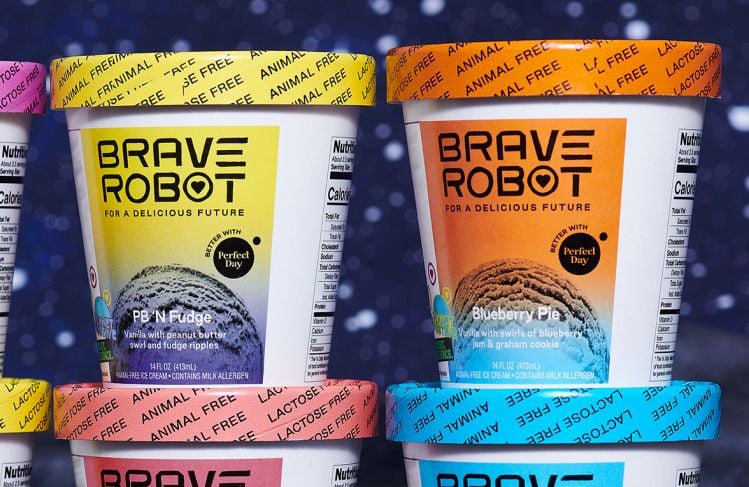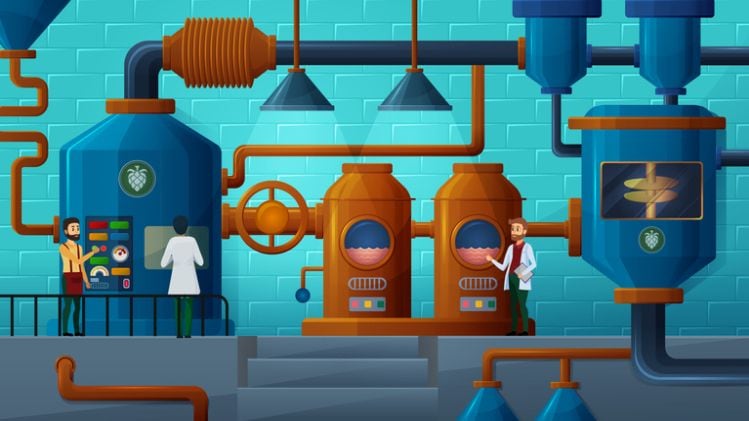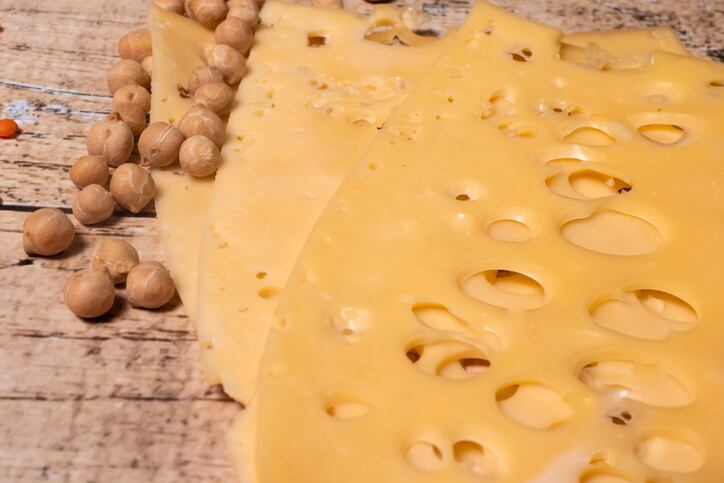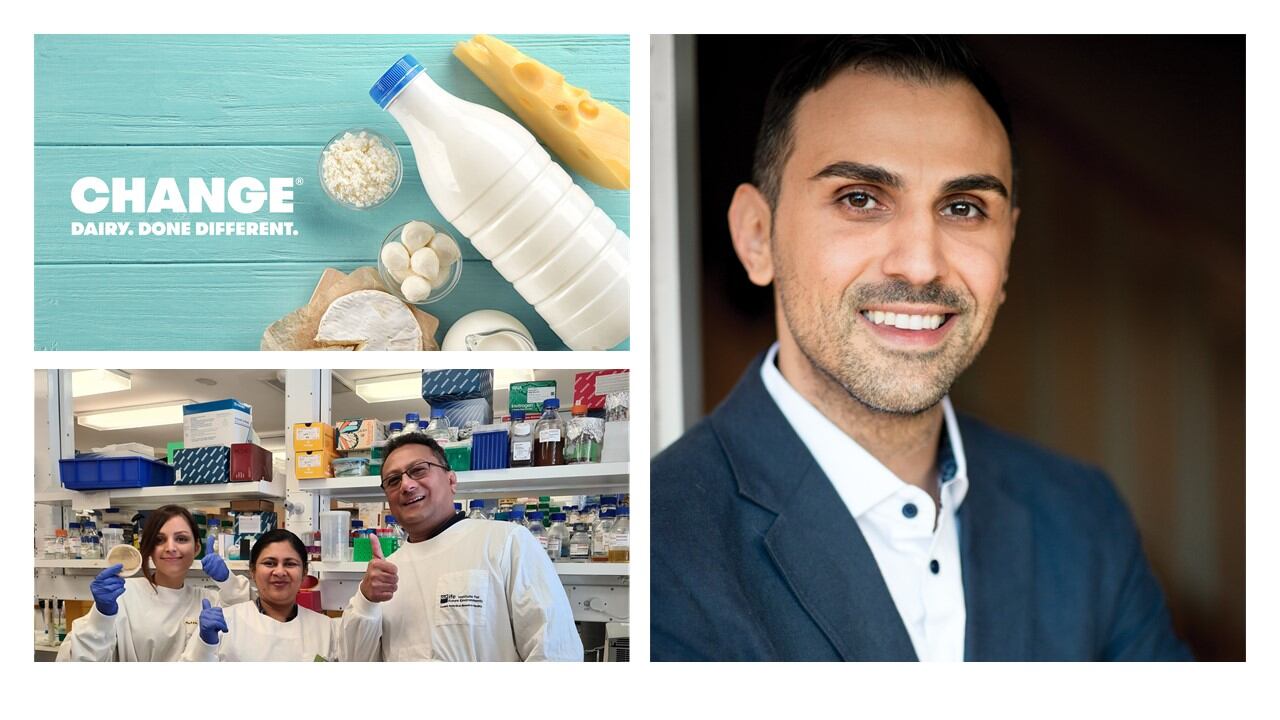It’s a question that companies in this emerging ‘precision fermentation’ space have been wrestling with since day one (Is ‘vegan dairy’ an oxymoron? How can animal proteins like whey be ‘animal free’? If we invent a new term like ‘flora-made’ will it catch on?) as part of a broader debate over how to describe animal products as they become de-coupled from, well, animals.
If it looks like a duck, swims like a duck, and quacks like a duck…?
In the plant-based arena, most companies use qualifiers (‘plant-based,’ ‘vegan,’ ‘dairy-free,’ ‘made from plants’) before the offending terms (meat/milk). And while Impossible Foods’ recent ‘We are Meat’ campaign (a phrase it doesn’t actually use in the ads themselves) has upset some commentators, the qualifying ‘made from plants’ stamp at the end spells out what its burgers are made from.
With precision fermentation and cell-cultured meat/milk, however, different issues are at play, because companies in this space are not simply mimicking the real thing, in many cases, they are making the same thing, just in a different way.
Cell-cultured meat is made from real animal cells (just without raising living, breathing animals), while protein characterization data from precision fermentation startup Perfect Day show that its ‘animal-free’ β-lactoglobulin (made with an engineered strain of the filamentous fungus Trichoderma reesei in a fermentation tank) is "identical to commercially available bovine-produced β-lactoglobulin [the key whey protein in cow’s milk].”
Players in the precision fermentation space are beginning to coalesce around the term ‘animal-free’ for the category
And that matters for lots of reasons, not least because consumers with milk allergies need to know that Perfect Day’s product actually is whey protein, and as such comes with an allergen warning, for example, says Irina Gerry, a former Danone executive who recently joined startup Change Foods (on a mission to bring ‘real’ dairy cheese - minus the cows - to market) as chief marketing officer.
(Read more about Change Foods HERE.)
Right now, says Gerry, players in the precision fermentation space are beginning to coalesce around the term ‘animal-free’ for the category, and ‘precision fermentation’ for describing the technology (engineering microbes to produce target food ingredients from whey protein to collagen).
“However, it’s still early days, and companies will be conducting further consumer research to verify recommended terminology in the coming months.”
She adds: “I remember trying to explain to Danone colleagues where I was going [the new job], and I couldn't even explain to them, as this whole non-dairy dairy concept is so confusing; it would take me three minutes to articulate what this is; it’s so new that it doesn't even have a name.”
‘If we all geek out and forget the fact that people want to eat food, we’re in trouble’
And when it comes to food marketing, says Gerry, words really matter, something players in the cell-cultured (aka ‘cell-based,’ ‘cultivated’) meat arena recognized pretty early on (spoiler alert: ‘lab-grown meat' doesn't sound very appetizing) although they have yet to reach 100% consensus.
“We can have the best technology, but if we all geek out and forget the fact that people want to eat food, we’re in trouble. Microbial fermentation? Please. Nobody, nobody wants to have that, it sounds spoiled. The objective is to be clear in terms of what it is and what it isn't, and to be differentiated from plant-based and cell-based [cell-cultured].”
‘We don't want to sound like a science experiment'
While some trade publications (including this one) use the term ‘microbial fermentation,’ meanwhile, this doesn’t mean anything to consumers, she adds. “Microbes equal foodborne illness… like Clorox is right there with microbial.”
If you take out the term ‘precision’ or ‘microbial’ and just stick with fermentation, however, there is also potential for confusion, she says, as ‘fermented dairy’ makes people think of things like yogurt and kefir made with cow’s milk.
“We don't want to sound like a science experiment or a Petri dish thing. That's why, to be honest with you, at Change Foods [which is hoping to test market products next year ahead of a larger 2023 launch], we're going B2C; we're building a consumer brand,” says Gerry.
“When you're building something so new and different, you need to educate consumers, the media, and industry organizations. At the end of the day, we're making food, we cannot talk tech.”
Putting on a united front when talking to regulators will also be important in the precision fermentation space, as the cell-cultured meat companies also appreciate, she says: “Being united and informed helps that conversation tremendously.”
We should also probably recognize “that what a reasonable consumer would expect today versus years from now [when meat, eggs and milk may be completely decoupled from animals] may also be different,” she adds.

Vegan dairy?’ What we're doing is like fundamentally oxymoronic’
So what about the ‘vegan’ question?
It’s not as simple as it sounds, first because the term ‘vegan’ is not actually legally defined in the US for food labeling purposes, and second, because not all vegans feel exactly the same about it, says Gerry.
‘Ethical’ vegans who avoid animal products because they don’t want to harm animals, or they’re against factory farming, might be totally cool with animal-free whey protein (Perfect Day’s founders are both vegan). Some vegans might even be fine with cell-cultured meat (although no one in the space is attempting to market this as vegan) because it doesn’t involve raising or slaughtering animals. Other vegans might not touch either of these things with a bargepole.
Arguably, Perfect Day’s animal-free whey protein is vegan because it is made without the use of animals, says cofounder Ryan Pandya, who acknowledged in a recent interview that ‘What we're doing is like fundamentally oxymoronic’ (vegan dairy; animal-free animal protein?).
“None of us has interacted with a single cow during our entire seven-year journey to this point. The initial DNA sequence came from a free scientific database and was used to create entirely animal-free DNA molecules… And our host organism is fungal, so non animal.”
Some consumers with milk protein allergies may use the term ‘vegan’ as a proxy for allergen-free
But just because the term ‘vegan’ might be technically accurate and legally defensible on brands using Perfect Day's dairy proteins, it might not always be helpful, he said.
“We learned that there are people out there with a dairy allergy that seek out vegan products, for example, so it just adds another guardrail for us to be thoughtful as we position these products and bring them to the world.”
Put another way, getting into the weeds of this issue in the FAQ section of your website makes sense, as it’s a question consumers certainly ask, says Gerry. But putting vegan on the product label itself may be risky given that some consumers with milk protein allergies may use the term ‘vegan’ as a proxy for allergen-free, and not spot the allergen warning.
The Vegan Society: ‘There is no legal definition of vegan’
According to The Vegan Society, "There is no legal definition of vegan and so companies can call or label a product as vegan, but this is The Vegan Society’s definition: The Vegan Society only registers products that do not and have not involved the use of any animal product, byproduct or derivative and do not or have not involved testing of any sort on animals... The Vegan Society understands the word 'animal' to refer to the entire Animal Kingdom that is all vertebrates and all multi-cellular invertebrates."
Given that microbes being used as host micro-organisms by precision fermentation companies are not part of the animal kingdom, while the DNA sequences used to instruct them are effectively strings of code that can be 3D printed by synthetic biology companies, you could infer that some of their wares might meet this definition (if they’re not tested on animals).
However, brands using Perfect Day’s animal-free whey protein such as Brave Robot and Nick’s “are not registered products with The Vegan Society Trademark so we are unable to comment on these products specifically,” says the Society.
The Good Food Institute breaks the microbial fermentation market down into three segments:
- Traditional fermentation – eg. Using the fungus Rhizopus to ferment soybeans into tempeh and lactic acid bacteria to produce cheese and yogurt, or fermenting plant-based proteins with mushroom mycelia to improve flavor and functionality (eg. by fermenting rice and pea protein with shiitake mycelia MycoTechnology reduces off tastes and aromas, improves solubility, and boosts their oil- and water-holding capacity).
- Biomass fermentation – Here, the microbial biomass itself serves as an ingredient with the cells intact or minimally processed (eg. Quorn, Nature’s Fynd, Superbrewed Food, Atlast Food Co and Meati Foods).
- Precision fermentation - Using microbial hosts as cell factories for producing specific functional ingredients that typically require greater purity than the primary protein ingredients and are incorporated at lower levels (eg. Perfect Day, Clara Foods, Motif FoodWorks, Change Foods, Final Foods, New Culture, Provenance Bio, Triton Algae Innovations).



